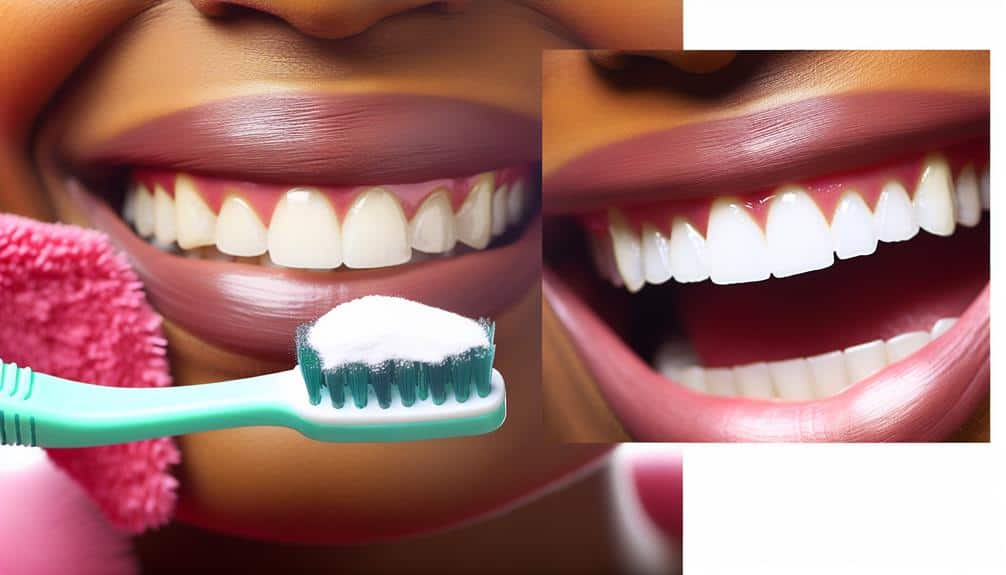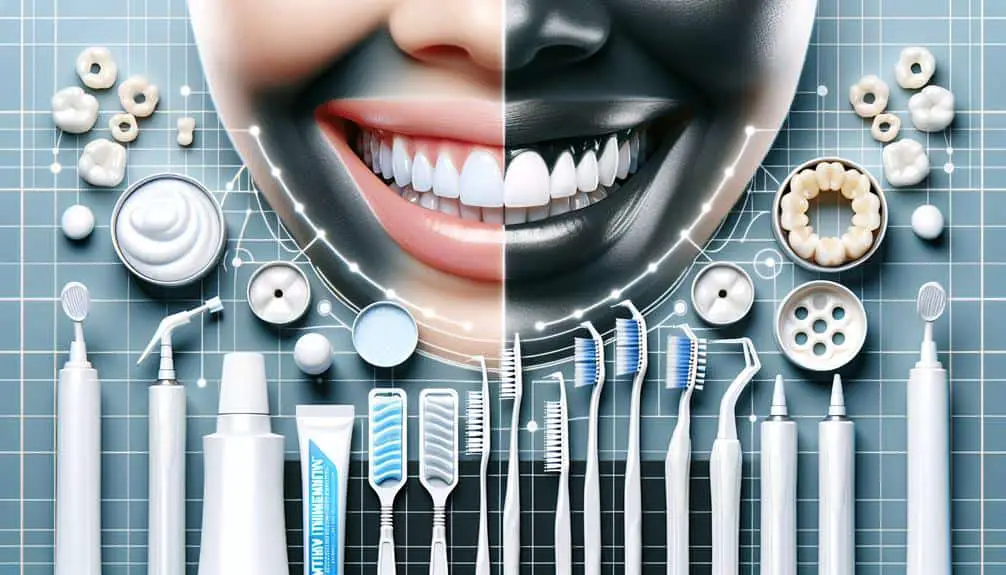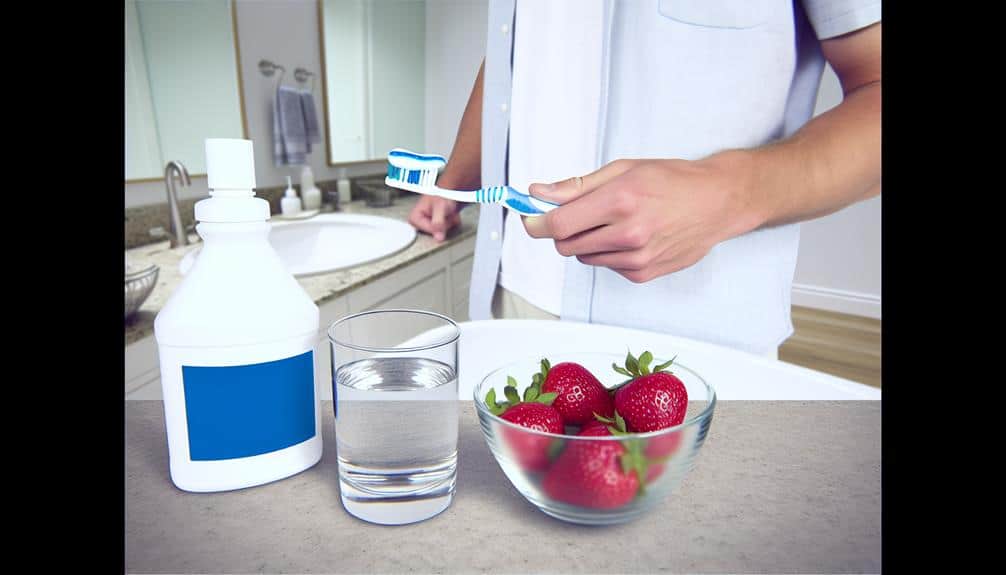Combat dark spots on your teeth naturally by incorporating herbal remedies such as chamomile, sage, and spearmint teas known for their whitening properties. Lifestyle changes like avoiding tobacco, stain-causing foods, and upping your intake of crunchy fruits and vegetables help scrub away stains. Enhance your oral hygiene regimen by brushing and flossing diligently. These natural remedies and habits set the foundation for a brighter smile without harsh chemicals or treatments.
Key Points
- Use herbal remedies like chamomile and sage teas for whitening properties.
- Maintain good oral hygiene habits to prevent plaque buildup and discoloration.
- Incorporate crunchy fruits and vegetables for natural scrubbing of stains.
- Try DIY treatments like baking soda and lemon juice paste for surface stain removal.
- Avoid foods like coffee and red wine to minimize teeth discoloration.
Causes of Dark Spots on Teeth
Dark spots on teeth are commonly caused by various factors such as smoking, certain foods, and poor oral hygiene habits. Smoking can lead to the accumulation of tar and nicotine on the teeth, causing dark stains. Foods like coffee, tea, red wine, and berries contain pigments that can stain the teeth over time if proper dental hygiene isn't maintained. Poor oral hygiene habits, such as irregular brushing and flossing, can result in plaque buildup, which eventually hardens into tartar and causes discoloration.
To prevent dark spots on your teeth, it's essential to adopt good dental hygiene habits. Brush your teeth at least twice a day using fluoride toothpaste and a soft-bristled toothbrush. Floss daily to remove food particles and plaque between your teeth. Additionally, consider using a mouthwash to help reduce bacteria in your mouth. Regular visits to the dentist for professional cleanings and check-ups are also vital in maintaining oral health and preventing dark spots on your teeth.
Natural Remedies for Dark Spots
To address dark spots on your teeth naturally, consider incorporating alternative remedies that can help brighten your smile and improve dental aesthetics. Herbal remedies have been used for centuries to promote oral health. Chamomile, sage, and spearmint teas are known for their natural whitening properties. You can brew these teas and rinse your mouth with them daily to help reduce dark spots.
Additionally, lifestyle changes can play a significant role in preventing and treating dark spots on teeth. Avoiding tobacco products and limiting foods and drinks that stain, such as coffee, tea, and red wine, can help prevent further discoloration. Maintaining good oral hygiene by brushing and flossing regularly is also essential.
Incorporating more crunchy fruits and vegetables like apples and carrots into your diet can help naturally scrub away surface stains. By combining herbal remedies with lifestyle changes, you can effectively combat dark spots on your teeth and achieve a brighter, healthier smile.
DIY Whitening Treatments at Home
Consider utilizing homemade whitening treatments to enhance the brightness of your teeth in the comfort of your own home. Here are four DIY techniques you can try to whiten your teeth naturally:
- Baking Soda and Lemon Juice: Create a paste by mixing baking soda with freshly squeezed lemon juice. Apply this paste to your teeth using a toothbrush and leave it on for about a minute before rinsing thoroughly. The mild abrasiveness of baking soda combined with the acidity of lemon juice can help remove surface stains.
- Strawberries: Mash up a ripe strawberry and mix it with a pinch of baking soda to create a natural whitening paste. Apply this mixture to your teeth, leave it on for 5 minutes, then rinse. Strawberries contain malic acid, which can help whiten teeth.
- Coconut Oil Pulling: Swish coconut oil around in your mouth for 15-20 minutes, then spit it out. This traditional remedy is believed to remove bacteria and promote whiter teeth.
- Turmeric Paste: Make a paste with turmeric powder and water. Apply it to your teeth and leave it on for 3-5 minutes before rinsing. Turmeric has natural anti-inflammatory properties and can help brighten teeth.
Foods to Avoid for Whiter Teeth
To achieve whiter teeth, it's advisable to steer clear of certain foods that can contribute to staining and discoloration. Two common culprits known for causing teeth discoloration are coffee and red wine. Coffee stains teeth due to its high concentration of chromogens, compounds that latch onto tooth enamel causing yellowing over time. Red wine contains chromogens and tannins that can lead to deep discoloration of the teeth, giving them a darker appearance.
When aiming for a brighter smile, minimizing the intake of these beverages can make a significant difference. If you do consume coffee or red wine, consider rinsing your mouth with water afterward to help prevent the staining compounds from lingering on your teeth. It's also beneficial to brush your teeth thoroughly after consuming these beverages to reduce the chances of stains setting in.
Professional Whitening Options
Minimizing the consumption of teeth-staining foods like coffee and red wine can pave the way for exploring professional whitening options to enhance the brightness of your smile. When contemplating professional whitening alternatives, there are several dental procedures available through cosmetic dentistry that can help you achieve a whiter smile effectively.
- In-Office Teeth Whitening: Professional whitening treatments done in a dental office provide quick and noticeable results, typically within one session.
- Take-Home Whitening Kits: Customized whitening trays provided by your dentist allow you to whiten your teeth at home at your convenience, following their guidelines for best results.
- Laser Teeth Whitening: This procedure involves the use of a laser to enhance the whitening effects of a bleaching agent applied to your teeth, offering efficient and often instant results.
- Porcelain Veneers: For more severe discoloration cases, porcelain veneers can be a long-lasting solution to achieve a bright, white smile by covering the front surface of your teeth with custom-made shells.
Frequently Asked Questions
Are Dark Spots on Teeth Always a Sign of Dental Issues, or Can They Be Purely Cosmetic?
When it comes to dark spots on teeth, they can be more than just cosmetic concerns. Regular dental checkups are essential to decipher if these spots indicate underlying dental issues or if they're simply cosmetic imperfections.
Can Dark Spots on Teeth Be Prevented With Good Oral Hygiene Practices?
To prevent dark spots on teeth, focus on a healthy diet impact and thorough oral hygiene. Lifestyle changes like avoiding tobacco and maintaining regular dental check-ups can help. Genetics may play a role, but good habits are key.
Are There Any Specific Vitamins or Minerals That Can Help Prevent Dark Spots on Teeth?
You might think superpowers like dietary supplements or home remedies could magically save your teeth from dark spots, but alas, no specific vitamins or minerals have been proven to prevent them.
How Long Do Natural Remedies Typically Take to Show Results in Fading Dark Spots on Teeth?
When using natural remedies for dark spots on teeth, the time for results varies. Factors like consistency, remedy effectiveness, and individual response play roles. Lifestyle changes and diet can impact the duration. Patience is key for successful fading.
Are There Any Potential Risks or Side Effects Associated With DIY Whitening Treatments at Home for Dark Spots on Teeth?
Before starting on DIY whitening treatments, guarantee your safety by taking sensible precautions. While natural remedies abound, potential risks like enamel damage or gum irritation may arise. Seek professional advice for safe DIY alternatives.



